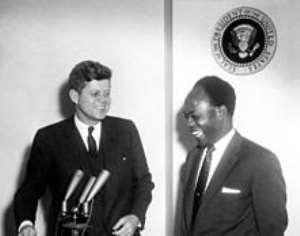
Kwame Nkrumah was one of Africa’s greatest leaders who inspired a lot of other African leaders. After fighting for Ghana’s independence in 1957, Nkrumah didn’t rest on his oars.
He liberated Congo from the hands of the Belgian monarchy after Leopold II had killed over ten million Congolese and after independence, the newly elected prime minister, Patrice Lumumba was assassinated by Belgium.
To pay back Ghana because of Nkrumah's collaboration with Patrice Lumumba, Belgium refused Ghana its embassy till now, showing their frustration and sadness over the loss of Congo. After the independence of Congo, Nkrumah liberated also the Republic of Guinea from the hands of France and Ahmed Sekou Touré became the head of state.
Nkrumah was a hero to African leaders and the entire African nation but to the West and America, he was an enemy and a stumbling block to their devilish schemes in Africa. In a coup, masterminded by the CIA, Nkrumah was deposed and died in exile. Below is one of Nkrumah’s speeches.
I am happy to be here in Addis Ababa on this most historic occasion. I bring with me the hopes and fraternal greetings of the government and people of Ghana. Our objective is African union now. There is no time to waste.
We must unite now or perish. I am confident that by our concerted effort and determination, we shall lay here the foundations for a continental Union of African States.
A whole continent has imposed a mandate upon us to lay the foundation of our union at this conference. It is our responsibility to execute this mandate by creating here and now, the formula upon which the requisite superstructure may be created.
On this continent, it has not taken us long to discover that the struggle against colonialism does not end with the attainment of national independence.
Independence is only the prelude to a new and more involved struggle for the right to conduct our own economic and social affairs; to construct our society according to our aspirations, unhampered by crushing and humiliating neo-colonialist control and interference.
From the start, we have been threatened with frustration, where rapid change is imperative, and with instability, where sustained effort and ordered rule are indispensable.
No sporadic act nor pious resolution can resolve our present problems. Nothing will be of avail, except the united act of a united Africa.
We have already reached the stage where we must unite or sink into that condition which has made Latin America the unwilling and distressed prey of imperialism after one-and-a-half centuries of political independence.
As a continent, we have emerged into independence in a different age, with imperialism grown stronger, more ruthless and experienced, and more dangerous in its international associations. Our economic advancement demands the end of colonialist and neo-colonialist domination of Africa.
But just as we understood that the shaping of our national destinies required of each of us our political independence and bent all our strength to this attainment, so we must recognize that our economic independence resides in our African union and requires the same concentration upon the political achievement.
The unity of our continent, no less than our separate independence, will be delayed, if indeed we do not lose it, by hobnobbing with colonialism. African unity is, above all, a political kingdom which can only be gained by political means.
The social and economic development of Africa will come only within the political kingdom, not the other way round. Is it not unity alone that can weld us into an effective force, capable of creating our own progress and making our valuable contribution to world peace?
Which independent African state, which of you here, will claim that its financial structure and banking institutions are fully harnessed to its national development?
Which will claim that its material resources and human energies are available for its own national aspirations? Which will disclaim a substantial measure of disappointment and disillusionment in its agricultural and urban development?
Africa's political history shall remain incomplete without the name of Kwame Nkrumah.




 Dumsor: Don't rush to demand timetable; the problem may be temporary — Atik Moha...
Dumsor: Don't rush to demand timetable; the problem may be temporary — Atik Moha...
 Space X Starlink’s satellite broadband approved in Ghana — NCA
Space X Starlink’s satellite broadband approved in Ghana — NCA
 2024 election will be decided on the grounds of the economy; choice of running m...
2024 election will be decided on the grounds of the economy; choice of running m...
 Dumsor: We're demanding less; just give us a timetable — Kwesi Pratt to ECG
Dumsor: We're demanding less; just give us a timetable — Kwesi Pratt to ECG
 Do I have to apologise for doing my security work, I won’t – Simon Osei-Mensah r...
Do I have to apologise for doing my security work, I won’t – Simon Osei-Mensah r...
 All my businesses have collapsed under Akufo-Addo — NDC Central regional chair
All my businesses have collapsed under Akufo-Addo — NDC Central regional chair
 Military, Prison Officers clash in Bawku, three injured
Military, Prison Officers clash in Bawku, three injured
 GRA-SML contract: MFWA files RTI request demanding KPMG report
GRA-SML contract: MFWA files RTI request demanding KPMG report
 Court threatens to call second accused to testify if NDC's Ofosu Ampofo fails to...
Court threatens to call second accused to testify if NDC's Ofosu Ampofo fails to...
 Family accuses hospital of medical negligence, extortion in death of 17-year-old...
Family accuses hospital of medical negligence, extortion in death of 17-year-old...
